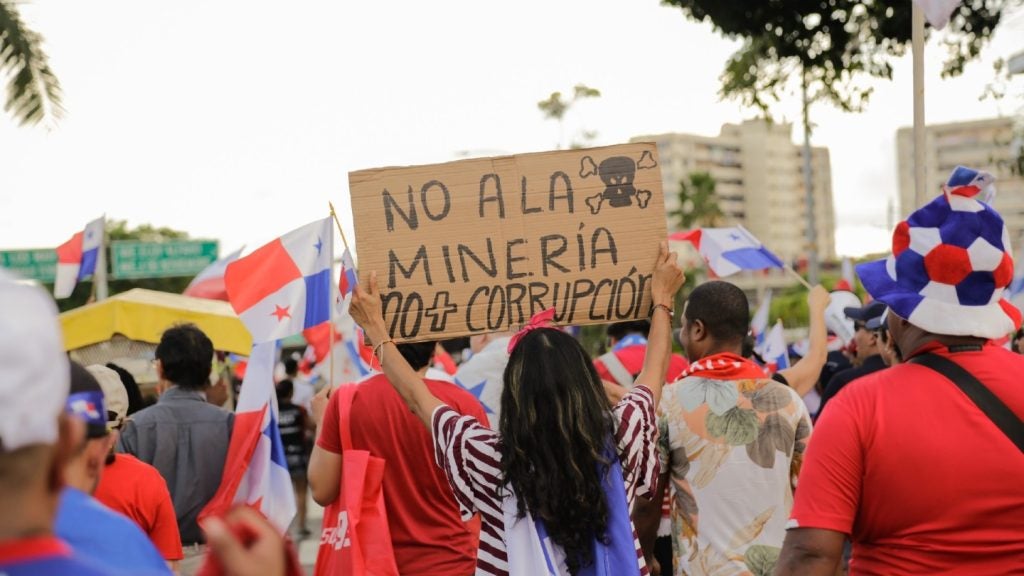Through the decades it is fair to say mining has earned itself a chequered reputation. The industry, driven by the world’s insatiable appetite for minerals, has routinely been linked or found responsible for corruption, human rights abuses and environmental degradation, mostly in the Global South.
In recent years, there has been a drive to mine more responsibly, from better social engagement with local and indigenous communities to decarbonisation, combatting corruption, increasing transparency and reducing environmental harm.
Despite this, as the energy transition ramps up and the west races to catch up with China in securing critical minerals, experts are sounding the alarm. They are concerned that loopholes in legislation governing mining still exist. They claim that many new responsible mining initiatives amount to ‘miners marking their own homework’ and that despite a myriad of global efforts and commitments, not much has meaningfully changed on the ground.
Combatting corruption in mining
When asked if the mining industry is operating more responsibly, Alex Kopp, a senior campaigner at NGO Global Witness, says that there has been some progress, “but largely there is a lot of talk and greenwashing without real change".
Take corruption: a large proportion of minerals needed for the energy transition are in countries with high levels of corruption, such as in central and sub-Saharan Africa. Previously the OECD has said the extractive sector accounts for one in five cases of transnational bribery.
Initiatives such as the Extractive Industry Transparency Initiative, which promotes the open and accountable management of oil, gas and mineral resources, have been important for creating more transparency on the issue of money exchanging hands for resources and mining contracts – but it hasn’t solved the problem, says Kopp, in part because it is voluntary.
While there are anti-bribery regulations in some western nations that apply to their domestic companies operating abroad, more needs to be done to enforce them, he says.
A recent case involving Glencore, one of the world's largest globally diversified natural resources companies, has shown progress in this respect.
Last year, Glencore was fined $700m by a US judge for a decade-long scheme to bribe foreign officials across several countries, paying more than $100m in bribes.
Further to this, in the UK, six former employees of Glencore were charged in September by the Serious Fraud Office with conspiring to make corrupt payments to benefit their company’s oil operations in West Africa.
The large fine and charges are "really important", says Kopp. However, the sum is a drop in the ocean to Glencore which made $34.1bn in earnings before interest, taxes, depreciation and amortisation (EBITDA) the year before.

“Companies can just factor that [the fine] in, it is not enough of a disincentive to corruption,” says Kopp. Indeed, it is not the first time Glencore has been fined for bribery payments to foreign governments; in 2022, it paid the SFO £280m ($400m).
Kopp suggests transparency around payments and contracts for resources made between companies and governments, which are often not made public, could be embedded in international agreements, akin to multilateral agreements and conventions such as the Paris Climate Accord. They would be signed, ratified by each country and there would be a mechanism for enforcement.
Otherwise, there is a risk of a race to the bottom where companies may compete in paying bribes to secure mining concessions in countries prone to corruption, he says.
It is a genuine risk and problem for mining companies, as Christopher Werner, CEO of C3 Bullion, which works with smaller-scale miners in Latin America, has experienced. Several years ago he says he was running a privately held US company that spent three years trying, and failing, to secure an environmental impact assessment (EIA) for a mining concession in Ecuador. They were forced to sell on to a Chinese company who, he claims, two weeks later “bulldozed a big portion of the site” without an EIA.
“Not all countries and companies within various countries operate in the same manner,” he says – a common complaint from western mining companies.
Tackling human rights abuses in mining
While there are anti-bribery laws that could be enforced better, often the same does not exist for human rights abuses and environmental disasters caused by western mining companies abroad.
There have been examples of local groups taking companies to court in their headquartered countries, such as in Canada and other countries. Yet, in the US there is no effective private right of action to bring claims against US companies – something NGO Earth Rights International is calling to be changed.
It claims companies can commit (or pay people to commit) torture, forced labour and murder in their foreign operations and get away with it. It is calling for a version of the US Foreign Corrupt Practices Act (FCPA), a landmark US law that makes it illegal for US-listed companies to bribe foreign government officials, but for human rights abuses.
“With a human rights version of the FCPA, if a US listed company was extorted by a paramilitary group or forced to pay a sketchy police unit, the company could cite the law as a reason for refusing to do so,” it says.
Canada-based International human rights lawyer James Yap has also discussed how Canada – where 60% of mining companies are headquartered – also does not have strong laws and institutions that are reasonably effective at preventing human rights abuses.
Stronger EU regulations on traceability
One lever that governments have to drive responsible mining is the supply chain. Downstream companies sourcing minerals have a duty to do so responsibility.
In July, the EU, which relies almost exclusively on imports of critical minerals, largely from China, enacted the Corporate Sustainability Due Diligence Directive, which will be enforced in 2027. The new rules are designed to ensure that companies identify and address adverse human rights and environmental impacts of their actions inside and outside of Europe, including value chains.

It also has the new EU Batteries Regulation, which was adopted last year and is entering into force in a phased manner. This means, starting in August 2025, any economic operator placing a battery on the EU market with specific critical materials will have to conduct due diligence for the entire supply chain.
“These are a great start,” says Emily Ritchey, policy manager, supply chains at T&E, a clean transport and energy advocate group, “but critically now we will see how it is implemented.”
Over the years there have been numerous efforts to create transparency in corporate value chains, but it has been notoriously difficult to do.
Are responsible mining regulations lacking in the West?
In response to the need to secure new energy minerals, many western governments are keen to increase mining closer to home. Under the EU Critical Raw Materials Act enacted in May 2024, a benchmark was set to domestically mine 10% of its annual consumption for extraction. Since the benchmark, EU laws are coming under increased scrutiny.
T&E in August commissioned a new legal analysis of the 2006 EU Extractive Waste Directive and found it lacking. It notes there is “a significant risk of fragmentation in the implementation of the directive”, with many key provisions not clarified and left at the discretion of the member states. In addition, it is unclear who is responsible when accidents or damage occurs, and how strong or regular prevention and monitoring planning should be, it states.
The group is calling for the directive to be turned into regulation so it will be directly applicable across all member states. It also wants it to be strengthened by, among other things, mandating companies to implement the safest tailings storage and monitoring techniques.
"Feedback we have received is that there is a lack of harmonised implementation… with many key provisions being left at the discretion or to the interpretation of the Member State," explains Ritchey.
Similarly in the US, David Kreamer, a professor of hydrology at the University of Nevada Las Vegas, says there are loopholes and large gaps in the regulation of water use, as well as large disparities between states.
“Environmental agencies have to follow laws that are antiquated and very, very open for mining,” he says.
He explains that under the Clean Water Act, the designation of what is water is open to exploitation; it allows mines to dam natural lakes and rivers and call them ‘waste treatment systems’ so the status of being a protected water goes away. Wetlands are also not considered waters. What’s more, a redefinition of the term 'fill material', under section 404 of the Clean Water Act, was amended to effectively mean that overburden and tailings from mines – hazardous materials – are now exempt from environmental protection rules and protections and permits, he says.
Responsible mining remains a priority and a challenge
There is no doubt that mining more responsibly has risen as a priority within the industry. The International Council on Mining and Minerals has been a driving force, particularly with its new Initiative for Responsible Mining Assurance. The initiative, which defines best practices for what responsible mining should look like at the industrial scale, has received praise from experts. However, they remain concerned that initiatives could be rolled back or sidelined.
Raising standards in mining reduces risk for miners, which can only be a good thing, but achieving it is undoubtedly hard. For many years in many countries, corruption has been a way of doing business, as has cutting corners.
Stakeholders warn there cannot be a repeat of past mistakes. Otherwise, miners will find it harder to secure the social licence to mine, and risk reputational damage, and worse, stoking conflicts. Therefore, the industry needs to keep working through the challenges, going further in achieving a future for mining that is more responsible and accountable than ever before.









